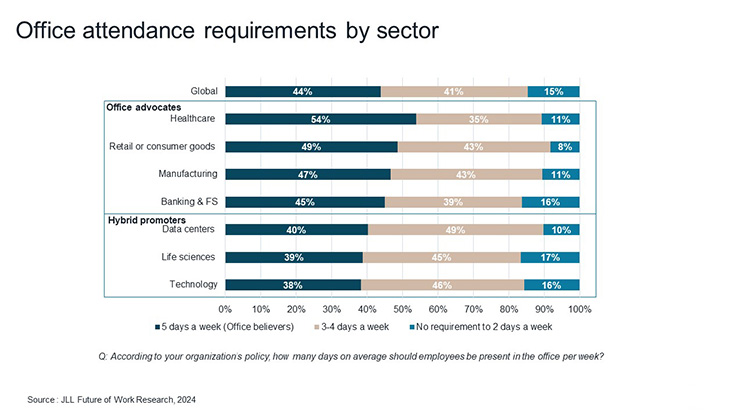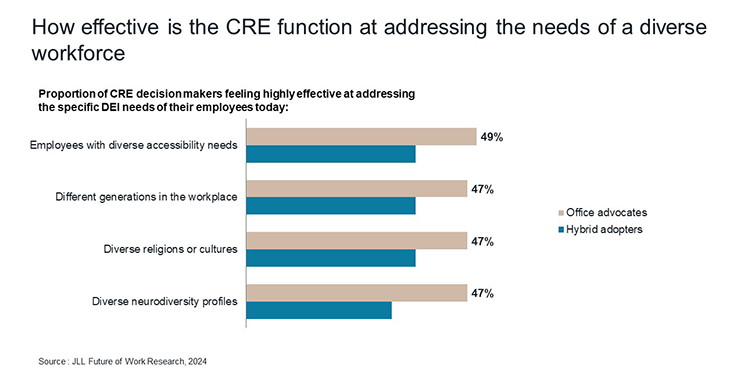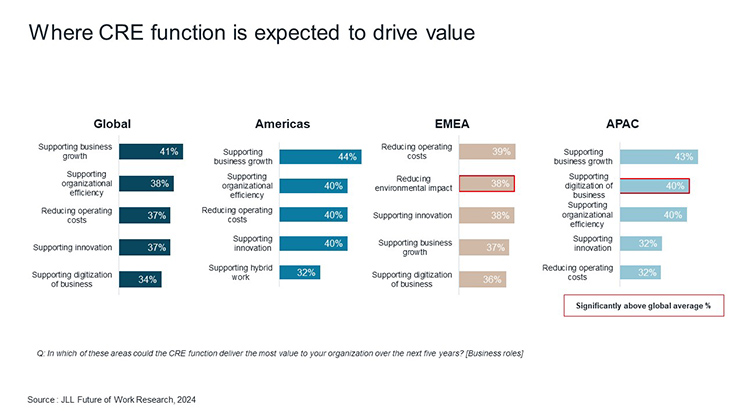Posted by Johann Nacario — September 23, 2024 — Despite the challenging commercial real estate (CRE) landscape and mixed economic environment, global business leaders are bullish on the future, with two-thirds (65%) expecting their CRE budgets to increase between now and 2030, as revealed in global provider of real estate and investment management services JLL’s Future of Work survey. The biennial, global survey explores the evolving world of work by assessing the key priorities, challenges and strategies that are top of mind for more than 2,300 business and CRE decision makers.
This year’s findings are unveiled through a series of articles exploring key areas of focus for corporate real estate teams: Managing the implications of shifting work patterns; Partnering with the C-suite to support CRE investment; Identifying CRE activities for “AI copiloting;” Moving from ambition to action on sustainability commitments; and Defining the future-fit CRE function. The first two articles, newly launched, dive into the effects of shifting work patterns on workplace expectations, and what the changing world of work means for the way the CRE function operates as more than 64% of leaders expect to increase and rebalance their headcount by 2030, in an attempt to recruit the right skills for the future.
Neil Murray, global CEO, Work Dynamics, JLL, stated:
Since our 2022 survey, the CRE landscape has become increasingly complex and dynamic, evolving toward better office use. We see that in these results, and in our conversations with clients. Looking ahead, business and CRE leaders working to drive talent and efficiency throughout their organization must consider the unique needs of their organization, and leverage tools such as tech, AI, and upskilling, as well as strategic partnerships across the value chain to enable the CRE function to reach its full potential as a powerful agent of transformation.
Competing visions on the most efficient workstyles create renewed CRE challenges
Business leaders are mainly focused on three corporate goals over the next five years: growing revenue through expansion and M&A (57%); attracting and retaining talent (53%); and achieving organizational efficiency (54%). However, the juxtaposition that lies between driving revenue growth through top talent and increasing efficiency requires leaders to delicately balance priorities and assess the role of offices as places that enable employees to deliver their best work.
Strong momentum toward office-based work since 2022 has brought forth expectations among respondents to increase use of office space (62%), where more than half of leaders plan to grow their total footprint over the next five years. Today, 44% of organizations are considered “office advocates,” who would like to see staff in the office five days a week — as compared to 2022, when just 34% of employees were working in the office full time. Hybrid work is here to stay, but the office is central to work again. Today, 85% of organizations have a policy of at least three days of office attendance per week, and 43% expect the number of in-office days to increase by 2030.
Globally, hybrid work is more likely to take place at large organizations in EMEA, where hybrid workstyles are considered a key part of the employee value proposition, and largely in sectors including e-commerce, energy and renewables, technology, and life sciences. Office advocates alternatively tend to be small-to-medium sized companies in APAC or the Americas, across sectors such as healthcare, retail and manufacturing. Beyond those big trends, the reality is often more complex, with different workstyles coexisting within many organizations.
Today’s office advocates also make a concerted effort to address diverse workplace needs — they are more focused on making accessible workplaces (49% vs. 36% of hybrid adopters), tailored to meet the needs of different generations, cultures and neurodiversity specificities, and may even pay a premium to occupy buildings with leading health and well-being credentials. With office attendance may also come new opportunities for compensation and career advancement: more than a third (39%) of respondents could envision introducing different pay and benefits to employees who attend the office regularly.
Cynthia Kantor, CEO, Project & Development Services, JLL, said:
The future of work looks different across companies and regions, reflecting the unique nature of organizations and employee needs. It keeps shifting and requires building evolutionary office programs and spaces, able to adapt to continuous changes in the workstyles. Globally, as CRE budgets and footprints receive new investment, the corporate real estate function must effectively partner with the C-suite to demonstrate the desired value.
The corporate real estate function can serve as a powerful agent of transformation, particularly with the use of technology, AI and the support of strategic partners
The value the corporate real estate function can deliver will vary depending on the needs of the organization and regional priorities. Globally, business leaders believe CRE can add the most value by supporting business growth (41%), enabling organizational efficiency (38%) and reducing operating costs (37%). Environmental, social and governance (ESG) factors are also an area in which the CRE function is expected to add value, especially in EMEA. Organizations in the Americas are more likely to expect CRE to support business growth, innovation and efficiency, while companies in Asia Pacific are more focused on digitization.
These varying expectations around value require agility throughout CRE functions, in a context where 41% of CRE decision makers report challenges with thinking and investing for the long term due to the pace of organizational change. The same percentage believe CRE is perceived as a cost center, rather than a value driver. Identifying the right metrics and ways to demonstrate value, in addition to strengthening relationships with the C-suite, will ensure CRE is more integrated into the wider business and positioned to quickly adapt to changing priorities — 46% of CRE leaders say influencing and leadership will be critical skills in the future.
Technology is also emerging with greater impacts for CRE, as more decision-makers expect to report to business transformation or technology by 2030. CRE leaders believe that 70% of their activities will be at least partially supported through the use of AI by 2030, and a quarter of the CRE function could be initially completed through automation — freeing up time for more strategic work. Nearly two-thirds (62%) of decision makers see technology and AI adoption as critical for enhancing the value that CRE delivers in the future. A “future-fit” CRE team should focus on high value-add tasks internally, while automation and AI take on routine and repetitive tasks and outsourcing partners are brought in for specialist tasks and individual projects.
Read the full The Future of Work Survey 2024 at JLL.







